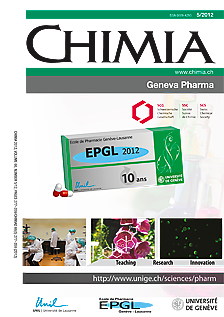New Insights in Pharmaceutical Analysis
DOI:
https://doi.org/10.2533/chimia.2012.330Keywords:
Capillary electrophoresis, Chemometrics, Fast analysis, Liquid chromatography, Mass spectrometry, Metabolism, Metabolomics, Toxicological analysisAbstract
The research unit of pharmaceutical analytical chemistry (PAC) has been active in the field of separation sciences for many years. Liquid chromatography (LC) and its latest improvements such as ultra-high performance chromatography (UHPLC) and supercritical fluid chromatography (SFC) are deeply and thoroughly studied, from a fundamental viewpoint to its various application capabilities. Electro-driven separations such as capillary electrophoresis (CE) are also a major field of interest, especially for macromolecules, and low cost. All these techniques are investigated with various detection modes including mass spectrometry (MS) for various applications where high sensitivity and selectivity is needed. Extracting the relevant information from the overwhelming amount of data generated by modern analytical platforms has become an important issue for knowledge discovery in various research fields. The appropriate treatment of such data is therefore of crucial importance to provide valuable information. Numerous works in our research group have demonstrated the usefulness of statistical and mathematical methodologies to improve quality of the results. Therefore, well-established chemometric approaches (e.g. design of experiments, multivariate data analysis, etc.) are implemented to optimize the analytical process from method development to data analysis.Downloads
Published
2012-05-30
Issue
Section
Scientific Articles
License
Copyright (c) 2012 Swiss Chemical Society

This work is licensed under a Creative Commons Attribution-NonCommercial 4.0 International License.
How to Cite
[1]
Chimia 2012, 66, 330, DOI: 10.2533/chimia.2012.330.







